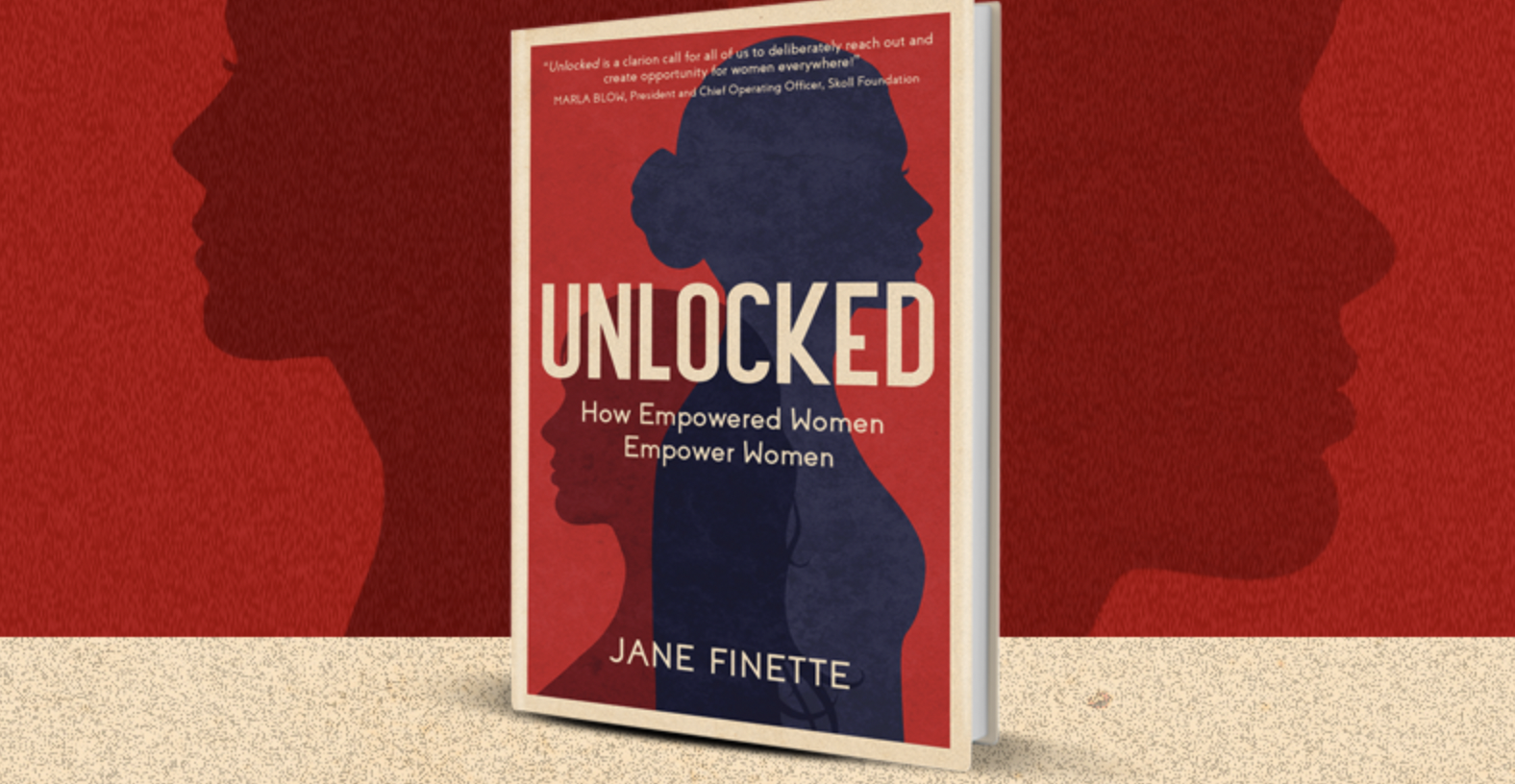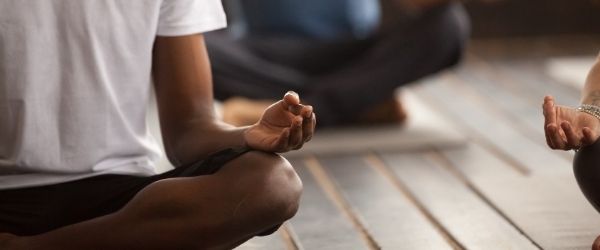I missed out on a peer forum experience when I was a global executive. Partly because I was constantly traveling the world on business trips to visit clients, attend conferences, and have meetings at our global HQ. Partly because I was unaware of peer advisory boards as an emerging category of leadership development. When I […]
Continue readingExcerpt from Jane Finettes’ Unlocked – How Empowered Women Empower Women

Key #9: Send the Elevator Down
When we are standing on top of a mountain and can look down to see how far we’ve come, I hope it’s with an overwhelming sense of pride and deep achievement. Because for women to make it to the top on their own terms, and not by trying to mimic their male colleagues, it’s not only a clear indication of sheer hard work but also a mark of pure grit and determination for what was needed to carve out our own untrodden and upward path. Take Lindsay Kaplan, cofounder at Chief.com, who not only leads authentically and publicly as a mother, but strives daily with her company to support women ascending their own mountains. Or Sophie McNaught Founder of The Shed, who in her spare time helps women become comfortable talking about money and teaches them how to invest. Whether directly or indirectly, they are creating ways to help more women advance.
For many of us, there was no one to help us rise. There was no Sherpa, no compass and no map, just our absolute tenacity, self-belief, and resilience “to get as far as we have. At times, it’s been as exhausting as the long, slow, altitude-crippling ascent of Kilimanjaro, and at others, as nerve-wracking as a sprint free-climb of El Capitan. To make it this far shows endurance, strength, skill, and fortitude.
More and more of us have now seen the view from the top and can attest it was worth the effort and what it will afford. But we can all admit, the ascent simply should not be so hard that only a few make it, and so unnecessarily arduous that some don’t think it’s worth trying at all. That’s why no matter your elevation or how long it took you to make the climb, you can make the journey up easier for someone else. If you can look down and see someone at the foot of the mountain, let’s give her the hand you wish you had, and:
Send the Elevator Down!
At the beginning of 2020, the number of women in senior roles was slowly improving, says The McKinsey and LeanIn.org Women in the Workplace study. The report accounts that between January 2015 and January 2020, representation of women in senior vice president positions grew from 23 to 28 percent, and representation in the C-suite grew from 17 to 21 percent. Slim gains, but 100 percent heading in the right direction. Alas, more than a year on from the start of the pandemic these numbers are expected to plummet. Women scaling the mountain has now become the equivalent of a dangerous ascent during hail, heavy rain, and gales with no shelter in sight. The study goes to report two million women are currently considering leaving the workforce due to challenges created by COVID-19.
At the other end of the leadership spectrum though, the Women in the Workplace study also highlights that for the sixth year in a row, women have continued to lose ground at the first step up of their careers, from entry-level position to manager. That initial missed promotion ends up holding women back for their whole careers.
Rachel Thomas, CEO and cofounder of Lean In, who were also coauthor of the report, explained to me in our interview that the so-called “broken rung” is a real blind spot for the business world, which is focused more on advancing women into senior leadership roles. “Many companies are aware of the glass ceiling and are working to support women reaching the high-level senior ranks. In reality, however, women are disadvantaged from the get-go. They can’t get a first foot on the ladder and then they can never catch up.” In essence, the barrier women face in reaching leadership equality can be traced all the way down to that very first promotion, if and when it actually happens.
The evidence is telling. The latest LeanIn.org and McKinsey 2020 Women in the Workplace study states, for “every one hundred men promoted to manager, only eighty-five women were promoted—and this gap was even larger for some women: only fifty-eight Black women and seventy-one Latinas were promoted. As a result, women remained significantly outnumbered in entry-level management at the beginning of 2020—they held just 38 percent of manager-level positions, while men held 62 percent.” And while the onus is still on organizations to fix bias in their own ranks on how young women leaders are advancing, there are some things we can do as empowered women to help them get their first step up so they can keep on climbing.
The first and most obvious step is to hire and promote her! Those statistics I pointed out should be alarming, and while there are beliefs that women are not asking for promotions and pushing themselves forward, data shared by Shelley Zalis in her 2019 article at Forbes Women says that women do, but they just don’t get the same results. So, if you have the authorization, power, influence, clout, and more—advocate, sponsor, and champion that passionate and ambitious young woman on your team or in your department and help her make it to manager level. The more women who can get a foothold, the more women have a chance.
If you do not have direct abilities to make promotions and lobby others to do so, consider giving exciting new projects and assignments to the young women on your team. Shelley Zalis continues, “bias confirms women are expected to prove themselves more than their male counterparts, and are often perceived as not being ready for the next level when they are more than capable.” When you award opportunities, you not only help her gain valuable experience, but you also help clearly demonstrate her abilities to others, which cannot be questioned nor denied.
Mentoring and coaching younger female members of your organization wherever possible will help her grow into a role ready for promotion. Teach her the importance of and how to grow her network and encourage her to meet with new people “every week outside of your organization. In every possible way, we can be supporting her growth, her visibility, and her rise through the ranks. Taking young women just starting out under our wing, no matter at our age, can have a monumental impact not just today but far into the future.
One such woman who has made many first ascents alone, and who now spends her days lifting others, is Colonel Candice Frost. She sent the elevator down by carving a multitude of first paths for women in the US Army. Since then, she has been determined to increase the number of women in positions of leadership across the military. Candice has spoken many times of why lighting other’s torches matters and shared with me, “We must all work to open doors for women, equitable representation is critical in both civilian life and the military.” Candice went on, “We must be impatient for change, and we must also be the change.” If we have risen to a position of power and influence, we have a responsibility, perhaps even an obligation, to pay it forward and help another woman rise. If it can be done in one of the most male-dominated professions in the world, then there is hope for us all.
In my interview with Toni Maloney, cofounder of Bpeace, she told me a story that has stayed with me ever since. It was a lesson shared with her by a former mentor, advertising tycoon David Ogilvy. He would say, “If you always hire people who are smaller than you are, we shall become a company of dwarfs. If, on the other hand, you always hire people who are bigger than you are, we shall become a company of giants.” Sometimes, we have a fear of promoting and elevating someone toward a role we fought so hard to win and that’s understandable. So, if you ever felt that way, try to recall Ogilvy’s advice, then beyond a company of giants, maybe we can also become a world of giants with women at the center.
When I think of sending the elevator down, I have a visual image of a mountain with a chain of women stretching from the very bottom to the very top. All the way along the climb, people are helping. If there’s bad weather, the climbers will find a haven. If they get lost, someone will help them back to the path. If they feel like giving up, the crowds gathering along the route will cheer them on. The more we help women rise, the more we will help women rise.
So, if opportunity isn’t knocking on a sister’s door, let’s step it up and help her break the wall down!”



















